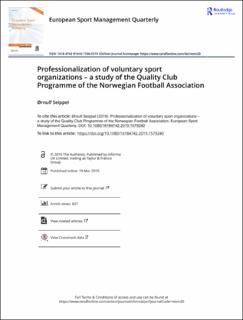| dc.contributor.author | Seippel, Ørnulf | |
| dc.date.accessioned | 2020-04-29T09:25:36Z | |
| dc.date.available | 2020-04-29T09:25:36Z | |
| dc.date.created | 2019-08-08T14:52:59Z | |
| dc.date.issued | 2019 | |
| dc.identifier.citation | European Sport Management Quarterly. 2019, 19(5), 666-683. | en_US |
| dc.identifier.issn | 1618-4742 | |
| dc.identifier.uri | https://hdl.handle.net/11250/2652890 | |
| dc.description | This is an Open Access article distributed under the terms of the Creative Commons Attribution-NonCommercial-NoDerivatives License (http://creativecommons.org/licenses/by-nc-nd/4.0/), which permits non-commercial re-use, distribution, and reproduction in any medium, provided the original work is properly cited, and is not altered, transformed, or built upon in any way. | en_US |
| dc.description.abstract | Research Question: This research investigates Norwegian football clubs’ participation in the Quality Club Programme (QCP) as a case of professionalization consisting of two stages – short term: more education, knowledge and documentation as well as better skills and improved organizational structure; long term: potential problems related to bureaucracy and full-fledged professions. In light of this distinction, the researchers ask the clubs why they take part in QCP and what they want to get out of it. This paper also invites reflections on the more troublesome part of voluntary organizations’ participation in processes of professionalization. Finally, we explore what the clubs understand to be the driving forces behind the programme and discuss whether these factors are conducive to the aims that the clubs have for their participation. Research Methods: The data comprise semi-structured interviews with 22 football clubs analysed by theme-based coding and categorization. Results and Findings: Clubs take part in QCP because they are expected to (i.e. institutionalization), to increase their autonomy and to improve their control over important resources: volunteers (i.e. resource dependency). To achieve this, the clubs see better routines, more predictability and improved structure as imperative. This study’s results show that what clubs report as making the programme function does not always work in favour of the clubs’ aims. Implications: The findings indicate that broad, multi-institutional approaches and action-oriented theories are necessary for understanding the choices and actions of voluntary sport clubs. Also shown is how the tools chosen for organizational development could be contrary to organizations’ aims. | en_US |
| dc.language.iso | eng | en_US |
| dc.subject | professionalization | en_US |
| dc.subject | football | en_US |
| dc.subject | voluntary organizations | en_US |
| dc.subject | organizational development | en_US |
| dc.subject | bureaucratization | en_US |
| dc.title | Professionalization of voluntary sport organizations: A study of the Quality Club Programme of the Norwegian Football Association | en_US |
| dc.type | Peer reviewed | en_US |
| dc.type | Journal article | en_US |
| dc.description.version | publishedVersion | en_US |
| dc.rights.holder | © 2019 The Author(s). | en_US |
| dc.source.pagenumber | 18 | en_US |
| dc.source.volume | 19 | en_US |
| dc.source.journal | European Sport Management Quarterly | en_US |
| dc.identifier.doi | 10.1080/16184742.2019.1579240 | |
| dc.identifier.cristin | 1714894 | |
| dc.description.localcode | Seksjo for kultur og samfunn / Department of Cultural and Social Studies | en_US |
| cristin.unitcode | 150,33,0,0 | |
| cristin.unitname | Seksjon for kultur og samfunn | |
| cristin.ispublished | true | |
| cristin.fulltext | original | |
| cristin.qualitycode | 2 | |
